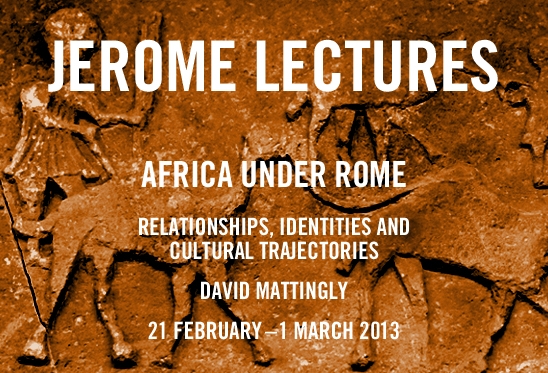David Mattingly – Africa under Rome: Relationships, Identities, and Cultural Trajectories

The Jerome Lectures are one of the most prestigious international series for the presentation of new work on Roman history and culture and are presented at both the American Academy in Rome and the University of Michigan. In 2013, the forty-first year of the lecture series, the eminent archaeologist and historian David Mattingly of Leicester University, will offer new interpretations on the interactions between the Roman Empire and the indigenous peoples of North Africa.
The consensus view of Africa in the Roman empire has tended to be closely aligned with the view from Rome and is heavily focused on the hundreds of urban sites, the huge volume of Latin epigraphy and the many extraordinary classical artworks. David Mattingly’s lectures will follow a different transect across the African landscape, using the concept of identity to explore inter- and intracommunal differences in behaviour and material culture in Roman Africa.
The lectures embrace the great swath of territory from the central Sahara to the coast spanning western Libya and eastern Algeria—the desert to the sea—during the last centuries BC and early centuries AD. The series starts with an overview of Africa and its varied populations in the pre-Roman period, contrasting the ancient historical and geographical sources with newly emerging archaeological evidence. The rest of the series looks at the relationship of three broad cultural communities with the Roman state: the army, the rural populations and townspeople. The second lecture focuses on the military community, reconsidering the development of the Roman frontier, the role of the army in Africa and the cultural self-definition of the garrison settlements and how and why these differed from indigenous settlements in the frontier zone. The third lecture explores the diverse histories, economic trajectories and cultural attributes of rural communities, asking to what extent these can be attributed to pre-Roman regional diversity or to active agency in response to Rome’s massive impact on land-use and landholding. The final lecture examines different types of urban biography in Africa and the possible explanations for the diversity detected.
Thomas Spencer Jerome (1864–1914) was an American lawyer and lover of Roman history who lived on Capri from 1899 until his death. In his will he endowed a series of lectures to be jointly administered by the University of Michigan and the American Academy in Rome, and delivered at both institutions. The revised lectures are typically published by the University of Michigan Press.
Thursday 21 February 2013
6pm, Villa Aurelia
Lecture I
Cultural Encounters in 1st Millennium BC Africa: Romans, Liby-Phoenicians and Libyans
Presenter: Christopher S. Celenza, FAAR'94, Director, American Academy in Rome
Saturday 23 February 2013
Seminar Discussion
Romanisation and Discrepant Identity: a visit to the exhibition Roma Caput Mundi and discussion
To participate, please contact Kim Bowes at kimberly.bowes [at] aarome.org (kimberly[dot]bowes[at]aarome[dot]org)
Monday 25 February 2013
6pm, AAR Lecture Room
Lecture II
Pacifying, Protecting, Policing, Posturing? The Military Community in Roman Africa
Presenter: Elizabeth Fentress, President, AIAC
Wednesday 27 February 2013
6pm, AAR Lecture Room
Lecture III
A World of Difference: Rural Communities in Africa under Rome
Presenter: Kimberly Bowes, FAAR'06, Andrew W. Mellon Professor, American Academy in Rome
Friday 1 March 2013
6pm, AAR Lecture Room
Lecture IV
Africa in the Roman Empire: Urban Identities and Urban Trajectories
Presenter: Luisa Musso, Professore, Università degli Studi Roma Tre